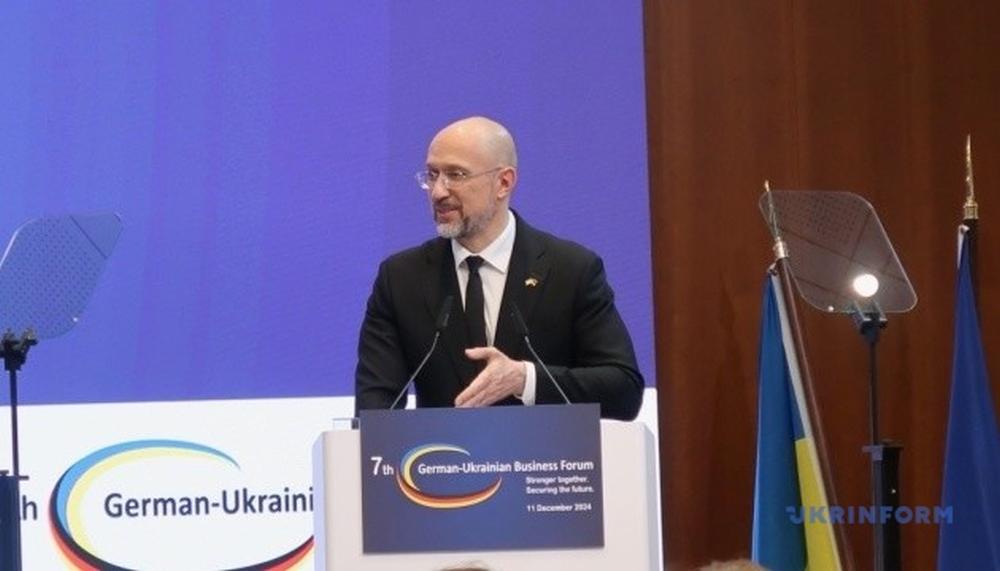European countries can gain strategic benefits in key sectors, including energy and defense, from cooperation with Ukraine.
Ukrainian Prime Minister Denys Shmyhal stated this at the 7th German-Ukrainian Business Forum, according to an Ukrinform correspondent.
“For Germany and all of Europe, Ukraine is a field of broad opportunities. This is a mutual movement, when German business invests in our economy and receives not only profit, but also strategic benefits in key industries. The first strategic benefit is critical raw materials. In the Ukrainian subsoil, there are 21 elements out of 30 identified by Europe as critical raw materials — lithium, graphite, cobalt, titanium, etc.
Today, Germany needs stable supplies of metals and rare earth elements to develop its production. This demand will only grow over time. Ukraine is able to satisfy it and, thus, give impetus to the growth of the German economy. We can become part of the EU’s single industrial chains of extraction, processing and supply,” he said.
According to Shmyhal, the second strategic benefit for Europe is security and defense.
“Ukraine has a large army, which has a unique combat experience of modern warfare and which is already fighting according to NATO standards. Our army is currently covering the eastern flank of Europe and will continue to do so. Our arms production is gaining momentum, and the capacity of the Ukrainian defense industry for 2025 stands at about $30 billion,” he said.
Shmyhal added that Ukraine has the largest number of joint ventures in the defense industry with Germany. These are projects for the repair and maintenance of armored vehicles and tanks, the production of infantry fighting vehicles, air defense systems, and missiles for them. There are also projects for the production of grenade launchers and anti-tank mines. According to Shmyhal, this area has broad prospects.
“Our defense industry has 800 enterprises and over 300,000 employees, production sites, highly qualified specialists, and the ability to produce a wide range of weapons. All this will work for our common security,” he said.
Shmyhal also noted that cooperation in the digital technology sector and cyber defense is promising.
“We have experience in building a 21st-century digital state. We are ready to share it with our German partners. Ukraine ranks second by the number of AI companies among countries in Central and Eastern Europe,” Shmyhal said.
He noted that the government plans to increase the share of innovative products in the country’s GDP to 15-20%.
The fourth strategic benefit of cooperation between the EU and Ukraine is the Ukrainian agricultural sector.
“We already feed 400 million people around the world, and we can feed more than 600 million. This guarantees food security in risky regions of Africa and Southeast Asia. We will help reduce migration pressure on Europe and promote social stability in EU countries,” Shmyhal said.
He noted that the fifth benefit is Ukraine’s energy sector. He expressed gratitude to the German government for its leadership in energy assistance.
“Germany has contributed over EUR 360 million to the Energy Support Fund for Ukraine. An additional EUR 100 million will be allocated to restore our energy system, and another EUR 70 million will be used to decentralize the Ukrainian energy sector,” he said.
Shmyhal added that after the war, Ukraine has every opportunity to be an energy hub. This includes the development of nuclear generation and renewable energy sources, which will help the EU get rid of Russian hydrocarbons. According to him, there is special potential in the production of biomethane – about 10 billion cubic meters per year. Ukraine also has the largest underground gas storage facilities in Europe with a capacity of over 30 billion cubic meters, which, according to Shmyhal, should become Europe’s “gas safe.”
The sixth strategic benefit, Shmyhal said, is joint logistics between Ukraine and the EU countries, and the seventh is recovery.
“Recovery is an ambitious pan-European project, where the role of business is key. Rebuilding buildings, energy, and transport infrastructure requires investments. The allocation of frozen Russian assets will help us create effective mechanisms for public-private partnership,” he said.
The 7th German-Ukrainian Business Forum is taking place in Berlin with the participation of the heads of government of both countries.
source ukrinform

